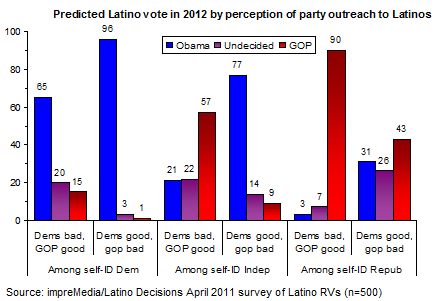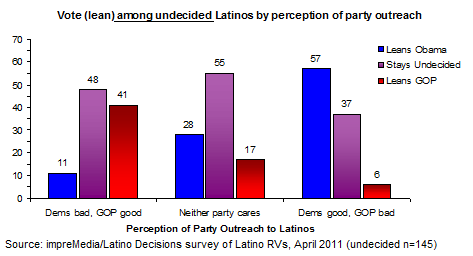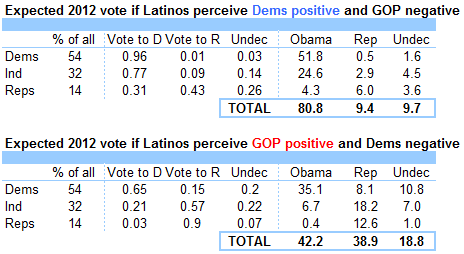Yesterday, Pilar Marrero of impreMedia reported that Latino voters were “dissatisfied with political parties” and despite majority approval ratings, Latino support for Obama is tepid heading into 2012. Despite a 73% approval rating, only 41% of Latino registered voters say they are certain to vote for Obama in 2012. This 32 point gap could spell trouble down the road.
Two months ago the February 2011 Latino Decisions tracking poll found 52% of Latino registered voters said the Democratic Party was doing a good job of reaching out to the Hispanic community. This month, that number has slipped slightly to just 47% who rate the Democrats positively on outreach. Even as President Obama has reached out in recent weeks participating in an education town hall meeting with Jorge Ramos of Univision, the perception among a majority of Latinos is that the Democratic Party has not done a good job of outreach. Why is this the case? Despite the focus on education at the Univision event, almost half the questions put to Obama by students, parents, and Ramos concerned immigration, including questions about why the DREAM Act did not get enough support to pass, and why non-criminal immigrants with U.S. citizen children were being deported? Still, the 47% who rate the Democrats favorably is more than double the 21% who rate the Republican Party as doing a good job of reaching out. As Marrero notes, neither party is doing a great job in making Latinos feel welcomed.
Indeed, this is a common theme of research by Prof. Sylvia Manzano, who noted in 2010 that Latinos feel less welcomed by both parties. Manzano was the first to note that a large discrepancy exists between the 65-70% of Latinos who may call themselves Democrats, and the much lower 38% who say the Democratic Party is very welcoming to Latinos. For Latinos, simple rates of party identification do not automatically translate into vote choice. In October of 2010, Manzano noted, “enthusiasm and long-term loyalty will require more than bold policy statements, political empathy and late hour GOTV efforts from Democrats”. While strategists and party leaders may feel they are doing a good job of reaching out to Latinos, what really matters is whether the Latino voting public actually sees it that way?
To put this theory to the test, we’ve taken the recently released April 2011 impreMedia/Latino Decisions tracking data, and run ordered logistic regression analysis to assess the degree to which perceptions of positive/negative party outreach have an independent effect on 2012 vote choice. Notably, we control for partisanship and other basic demographics in our model, which allows us to pinpoint the exact influence that perceived party outreach has on vote choice. The results are quite clear: perceived party outreach has a statistically significant and robust influence on whether Latinos intend to support Obama, or a Republican challenger in 2012 (regression results here). Likewise, using data from 2009 Manzano found in regression analysis that perceptions of how welcoming a party is towards Latinos greatly effects their strength of partisan attachment. Clearly stated, perceptions matter; and they matter a whole lot.
The chart below graphs the predicted probability that a Latino will vote for Obama, vote Republican or remain undecided in 2012, and is sorted from left to right by their stated party identification. Within each grouping of partisans, there are two subgroups: (1) those who perceive the Democrats are doing a bad job, but the Republicans good; and (2) those who perceive the Democrats are doing a good job, but the Republicans bad. In the paragraph below, we walk through the interpretation of each result.
Figure 1

Starting at the left-hand side, among Democratic Latinos: if they perceive the Democrats are doing good and the GOP bad, a vote for Obama is certain, predicted at 96%. However, if Democrats perceive their own party to be doing a poor job of outreach and the Republicans are doing good, just 65% of Latino Dems would vote for Obama, and as many as 15% would vote Republican. Likewise, the same trend exists on the right-hand side of the graph for Latino Republicans. If they perceive their own party doing well on outreach 90% are predicted to vote Republican in 2012, however this figure drops to just 43% Republican vote – among Republicans – if they think the GOP is doing a bad job of outreach to Hispanics, and the Dems are doing good. Most important are the Latinos in the middle of the graph, the Independents. If Independent Latinos perceive the Republicans as doing good outreach they vote Republican 57% to 21% in 2012, whereas if they perceive Democrats as doing the best job they vote Democrat by an even bigger 77% to 9%.
Like Independents, the importance of perceived party outreach is especially key to those who said they were undecided in the 2012 election. In asking about their intended vote choice in 2012, 29% of Latinos said “undecided” and we asked the follow-up question, Okay, but if you had pick right now are you leaning towards voting for Obama, or for the Republican challenger in 2012?. Among these undecided voters, 34% said they were leaning towards Obama, 17% were leaning towards a Republican, and 49% remained undecided. As is evident in the figure below, perception of party outreach greatly influences which way undecided voters will break. Among those who think the Democrats are not doing a good job, but the Republicans are, only 11% leans Obama and 41% leans Republican. In direct contrast, among undecideds who think the Democrats are doing a good job of outreach but Republicans aren’t, 57% lean towards Obama and just 6% to a Republican challenger.
Figure 2

So given the results of our analysis presented above, how will the Latino vote break in 2012? Of course that depends on what Latinos think of each party’s outreach to the Latino community. In the table below, we’ve taken two possible scenarios from the first bar chart above. The first scenario sums up the Latino vote if Latinos perceive the Democrats positively and Republicans negatively. In each row, we multiply the number of Latinos who are either Democrat, Independent, or Republican by the predicted vote outcomes in figure 1 above. If Latinos perceive the Democratic outreach positively and the Republican outreach negatively Obama would win 80.8% of the Latino vote to 9.4% for a Republican challenger and 9.7% undecided. In contrast, the potential outcome in the second scenario looks very, very different. In the second half of the table, we sum Latino votes under the scenario where Latinos perceive the Democratic outreach as poor, and the Republican outreach as positive. Again, using the predicted vote rates in figure 1 above, we arrive at an overall estimate of 42.2% vote for Obama, 38.9% vote for a Republican challenger and 18.8% undecided. Of course in reality Latino views of the two parties will be varied, and not uniform, but the examples here illustrate just how important the perception of party outreach is to the Latino vote. In 2012 both Democrats and Republicans have an opportunity to improve on their current perception among Latinos, and whether or not they do will have a very significant impact on the results of the 2012 presidential election.

- Matt A. Barreto, Ph.D., Associate Professor Political Science at University of Washington, and co-founder of Latino Decisions can be reached at: [email protected]

